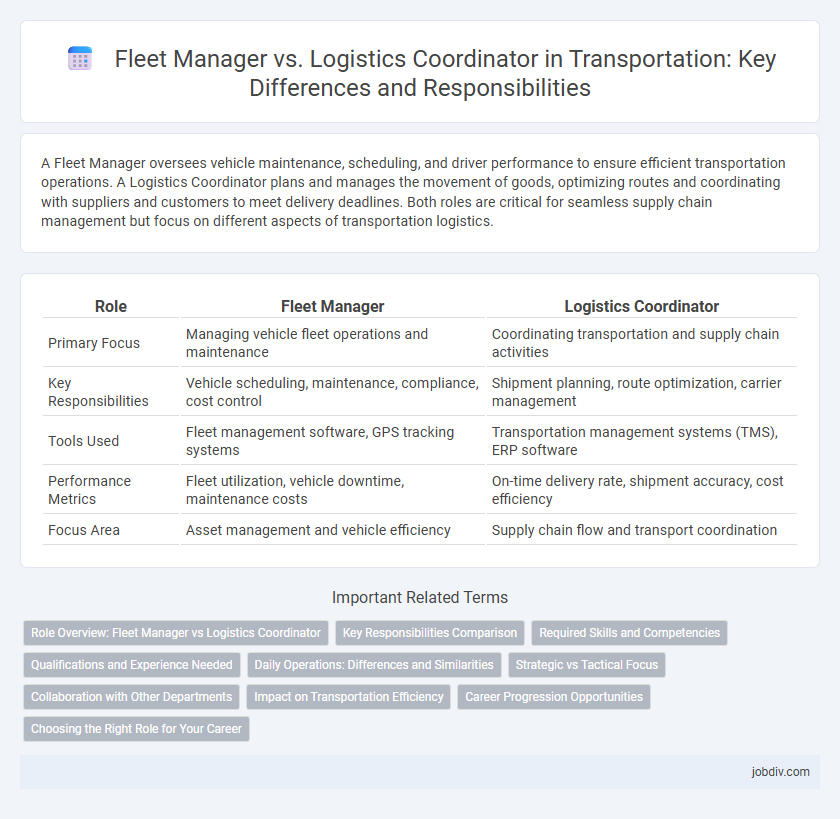A Fleet Manager oversees vehicle maintenance, scheduling, and driver performance to ensure efficient transportation operations. A Logistics Coordinator plans and manages the movement of goods, optimizing routes and coordinating with suppliers and customers to meet delivery deadlines. Both roles are critical for seamless supply chain management but focus on different aspects of transportation logistics.
Table of Comparison
| Role | Fleet Manager | Logistics Coordinator |
|---|---|---|
| Primary Focus | Managing vehicle fleet operations and maintenance | Coordinating transportation and supply chain activities |
| Key Responsibilities | Vehicle scheduling, maintenance, compliance, cost control | Shipment planning, route optimization, carrier management |
| Tools Used | Fleet management software, GPS tracking systems | Transportation management systems (TMS), ERP software |
| Performance Metrics | Fleet utilization, vehicle downtime, maintenance costs | On-time delivery rate, shipment accuracy, cost efficiency |
| Focus Area | Asset management and vehicle efficiency | Supply chain flow and transport coordination |
Role Overview: Fleet Manager vs Logistics Coordinator
A Fleet Manager oversees the maintenance, deployment, and efficiency of company vehicles, ensuring compliance with safety regulations and optimizing fleet performance. A Logistics Coordinator focuses on planning and executing transportation schedules, managing inventory movement, and coordinating between suppliers, warehouses, and clients to meet delivery deadlines. Both roles are essential for seamless supply chain operations, with the Fleet Manager emphasizing asset management and the Logistics Coordinator prioritizing operational flow.
Key Responsibilities Comparison
Fleet Managers oversee vehicle maintenance, route planning, and compliance with transportation regulations to ensure efficient fleet operations. Logistics Coordinators handle the scheduling, shipment tracking, and communication between suppliers, drivers, and customers to optimize supply chain flow. Both roles require strong organizational skills but differ in focus, with Fleet Managers emphasizing asset management and Logistics Coordinators focusing on operational logistics.
Required Skills and Competencies
Fleet Managers require strong leadership, strategic planning, and vehicle maintenance knowledge to optimize fleet operations and reduce costs. Logistics Coordinators need excellent organizational skills, supply chain expertise, and proficiency in route planning software to ensure timely delivery and inventory management. Both roles demand effective communication, problem-solving abilities, and familiarity with transportation regulations to maintain smooth operational flow.
Qualifications and Experience Needed
Fleet Managers typically require a background in transportation management or logistics, often holding a bachelor's degree in business administration or supply chain management along with several years of experience in fleet operations. Logistics Coordinators usually possess qualifications in logistics, supply chain management, or a related field, with strong organizational skills and experience in coordinating shipments and inventory management. Both roles benefit from proficiency in transportation management systems (TMS) and knowledge of regulatory compliance specific to freight and cargo handling.
Daily Operations: Differences and Similarities
Fleet Managers oversee vehicle maintenance schedules, driver assignments, and compliance with transportation regulations, ensuring efficient fleet utilization and safety. Logistics Coordinators focus on planning routes, managing shipments, and tracking deliveries to optimize supply chain flow and meet customer deadlines. Both roles require strong organizational skills and collaboration to maintain operational efficiency and cost control within daily transportation activities.
Strategic vs Tactical Focus
Fleet Managers concentrate on strategic planning, optimizing vehicle usage, maintenance schedules, and long-term cost efficiency to enhance overall fleet performance. Logistics Coordinators handle tactical execution, managing daily shipments, route planning, and real-time problem-solving to ensure timely delivery and compliance. The strategic focus of Fleet Managers aligns with organizational goals, while Logistics Coordinators prioritize operational efficiency and immediate logistical challenges.
Collaboration with Other Departments
Fleet Managers collaborate closely with maintenance, procurement, and finance departments to ensure vehicle readiness, cost control, and compliance with safety regulations. Logistics Coordinators work alongside sales, warehouse, and customer service teams to optimize shipment schedules, track inventory, and improve delivery efficiency. Effective collaboration between both roles enhances overall transportation operations, reduces delays, and supports seamless supply chain management.
Impact on Transportation Efficiency
Fleet managers optimize vehicle utilization and maintenance schedules to reduce downtime and fuel consumption, directly improving transportation efficiency. Logistics coordinators streamline route planning and shipment tracking, ensuring timely deliveries and minimizing delays. Together, their roles complement each other by enhancing operational workflows and boosting overall supply chain performance.
Career Progression Opportunities
Fleet Managers typically advance by overseeing larger vehicle fleets and integrating advanced telematics systems, enhancing operational efficiency and cost control. Logistics Coordinators often transition into supply chain management roles, leveraging skills in route planning and inventory coordination to optimize end-to-end logistics processes. Career progression in both paths depends on acquiring expertise in data analytics, regulatory compliance, and technology-driven solutions within the transportation sector.
Choosing the Right Role for Your Career
Fleet Managers oversee vehicle maintenance, driver management, and regulatory compliance, ensuring efficient fleet operations for transport companies. Logistics Coordinators plan and execute shipment schedules, manage inventory flow, and coordinate with suppliers and carriers to optimize supply chain performance. Selecting the right career depends on your strength in operational oversight and leadership for Fleet Management or your aptitude for detailed scheduling and resource coordination in Logistics.
Fleet Manager vs Logistics Coordinator Infographic

 jobdiv.com
jobdiv.com